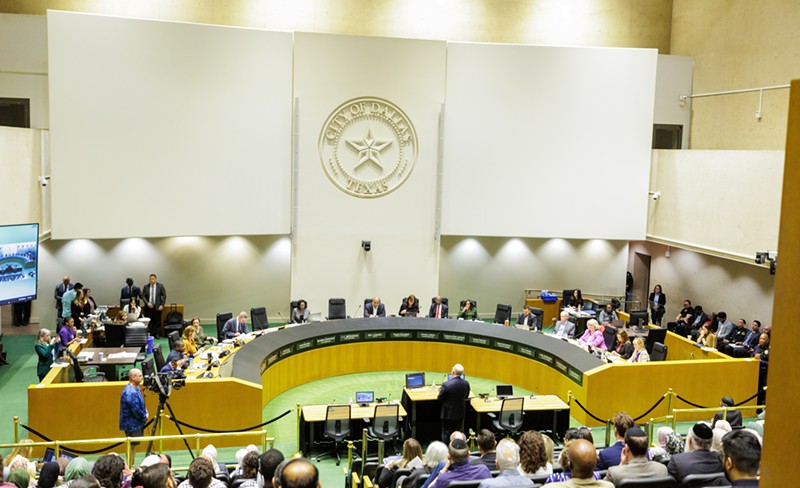The Dallas City Council parsed through recommended amendments to the Dallas City Charter, including those submitted by the council’s own members, during seven hours of deliberation Wednesday afternoon. Ranked choice voting, November elections, council member term lengths and council salaries were some of the hot-button issues discussed.
The charter, which acts as the city’s governing document, is amended every 10 years through a lengthy process in which amendments are recommended by a 15-member Charter Review Commission, finalized by the city council and voted on by residents. The current charter requires the review to take place every 10 years.
“That review could result in no changes, but it never really does,” former Dallas City Council member Philip Kingston told the Observer earlier this year. “[The charter review process] allows everybody to kind of take a look at what works and what doesn’t work and see if they can develop proposals to improve the document with the goal of improving the governance of the city.”
The Charter Review Commission submits a list of suggested edits to the document, but council members are able to submit their own amendments. Seventeen amendments to the charter have been recommended by council members this year, and 12 of those were discussed by the horseshoe on Wednesday. While council members held up green cards to indicate support of an amendment, the "straw votes" are non-binding and merely indicate how a council member anticipates voting when the final decisions are made later this month.
Council Member Recommendations
Municipal elections have been a prominent topic that council members seem keen to address with the charter. In a suggestion that garnered no support from the council, member Chad West proposed moving city elections from May to November in odd-numbered years, with council terms to remain at the current length of two years. West argued that the switch would result in savings for the city, but City Secretary Billierae Johnson said the savings amount would be “relatively small.”
Council member Paul Ridley said he was concerned that moving city council elections to November, when state and national elections take place, could result in the races becoming partisan and place the city council near the bottom of the ballot. The financial impact on Dallas ISD and Dallas County, the bodies with which the city splits the cost of May elections, was a concern for council member Omar Narvaez. The motion failed, with West as the single member voting in favor, prompting council member Carolyn King Arnold to remind everyone, “We do still love our hanging Chad.”
But West did get support for an amendment to transition the council to four-year terms starting in 2026. With the suggested change, council members would be limited to two terms. After the council discussed the merits of a three-year versus four-year term, the majority showed support for moving to the four-year model.
Amendments put forward by Adam Bazaldua gained support, advocating for a preamble declaring Dallas an “equitable democracy” to be added to city charter and for a provision allowing members of the council outside of the Mayor to call meetings to order when a quorum is reached. The text of the proposed preamble is not finalized, but the sentiment gained widespread support from members who agree the city's governing document should include a vision statement.
“Given that it’s not an item in the charter itself but rather sets the tone for the Dallas we are and hope to become, I’m supportive,” council member Gay Donnell Willis said.
The council also agreed to move forward with a motion that will allow the mayor pro tem to call a meeting to order when a quorum is reached before the mayor is present, and the deputy mayor pro tem to call the meeting if both the mayor pro tem and the mayor are absent. Bazaldua said he was inspired to draw up the amendment after hearing frustrations from residents “time and time again” because of the council’s late starts.
Wednesday’s meeting began 52 minutes after the posted starting time.
“I think it’s just about respecting people’s time,” Bazaldua said. “I think it’s about efficient government. I think it’s about adopting a culture of professionalism.”
Ridley’s amendment updating an “archaic” provision on associate municipal judges was voted through, and an amendment suggestion from Dallas Mayor Eric Johnson was sent to Government Performance & Financial Management for further consideration. Johnson is arguing for the charter to allow the city manager to offer a contract to the chief of police, a response to the very specific corner the city found itself backed into last month when Austin and Houston expressed interest in hiring Dallas Police Chief Eddie Garcia.
Charter Review Commission’s Recommendations
One amendment that has received a lot of attention proposes to double council members’ salaries, hiking the pay to $125,000 a year from the current $60,000. Bazaldua and council member Kathy Stewart suggested lowering that salary to $95,000 and $80,000, respectively. “I am not afraid to say we deserve more pay,” Bazaldua said, noting that 2014 was the last time council member salaries were adjusted. The discussion was tabled until a June 18 meeting, with Bazaldua and Stewart agreeing to coordinate an amendment that splits the difference between their recommended salaries.
Bazaldua was also an outspoken supporter for a provision that would allow any resident living legally in Dallas to serve on the city redistricting commission, the city plan commission, the civil service board and the park and recreation board. City staff recommended that using the language “authorized residents” would be considered more palatable by voters, but most council members showed support for allowing “Dallas residents” to serve on the boards and commissions.
A suggestion for a trigger law that would make ranked choice voting go into effect if the Texas Legislature moves in favor of the process drew strong objections. A majority of members said the ranked choice voting would add undue complexity to the voting process and would be premature action ahead of the state body’s vote. The commission recommendation was delegated to the Government Performance & Financial Management committee for further consideration.
Amendments to the Dallas city charter will be discussed and voted on during a June 26 council meeting.












